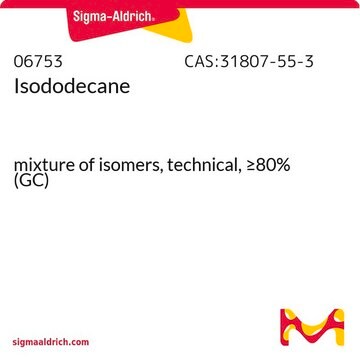128511
2,2,4,4,6,8,8-Heptamethylnonane
98%
Synonym(s):
HMN
About This Item
Recommended Products
vapor density
7.9 (vs air)
vapor pressure
<1 mmHg ( 20 °C)
assay
98%
form
liquid
refractive index
n20/D 1.439 (lit.)
bp
240 °C (lit.)
density
0.793 g/mL at 25 °C (lit.)
SMILES string
CC(CC(C)(C)C)CC(C)(C)CC(C)(C)C
InChI
1S/C16H34/c1-13(10-14(2,3)4)11-16(8,9)12-15(5,6)7/h13H,10-12H2,1-9H3
InChI key
VCLJODPNBNEBKW-UHFFFAOYSA-N
Looking for similar products? Visit Product Comparison Guide
Related Categories
Application
signalword
Danger
hcodes
Hazard Classifications
Asp. Tox. 1
supp_hazards
Storage Class
10 - Combustible liquids
wgk_germany
WGK 3
flash_point_f
215.6 °F - closed cup
flash_point_c
102 °C - closed cup
ppe
Eyeshields, Gloves
Certificates of Analysis (COA)
Search for Certificates of Analysis (COA) by entering the products Lot/Batch Number. Lot and Batch Numbers can be found on a product’s label following the words ‘Lot’ or ‘Batch’.
Already Own This Product?
Find documentation for the products that you have recently purchased in the Document Library.
Customers Also Viewed
Our team of scientists has experience in all areas of research including Life Science, Material Science, Chemical Synthesis, Chromatography, Analytical and many others.
Contact Technical Service














